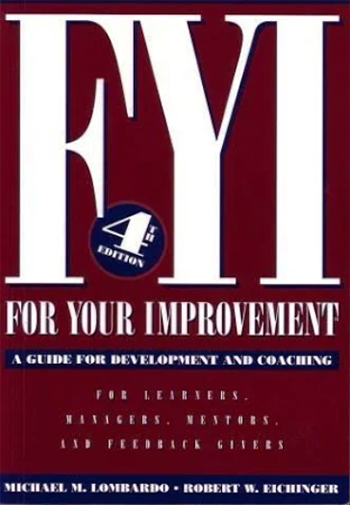
Are there times when you have trouble understanding the people you work with?
There has been a lot of education on this topic, from classes, reading articles to simply talking to people. But let’s remember our old standby: books. Usually, books have come through for me in the past and provided the right words and context.
One of these books is FYI: For Your Improvement, A Guide for Development and Coaching by Michael M. Lombardo and Robert W. Eichinger. Recently, it helped shift my perspective ever so slightly on something I’ve been working to understand. Whether you work with a diverse group of individuals or you are responsible for offices outside the United States, FYI is on point.
In FYI, the authors discuss cultural differences such as universalistic vs. particularistic, individualistic vs. collectivistic, and neutral vs. affective. The book gives short descriptions of a few countries and shows which categories they fall under.
The idea is to “build a framework for understanding cultures different from your own.” Even if an individual has lived in the United States their whole life, it’s possible for elements of their native culture to be prevalent in their thinking or job performance. Knowing what to look for is good information for a manager. As I understand more about a certain culture, I hope my interactions with an employee can be framed better. That doesn’t mean managers should change their expectations on standards of performance or behavior in the workplace. But by understanding where employees are coming from, maybe managers can be more successful in guiding them to achieve and meet expectations.
FYI explains how in an individualistic culture such as the United States, we consider the individual responsible for his or her actions. However, in a collectivistic culture like in China or Japan, the group is more important. Could this have a significant impact on someone’s ability to meet your expectations of them as an individual?
Currently, I live in the Pacific Northwest of the United States where the culture is incredibly diverse. I hear different languages all the time—English, Spanish, Vietnamese, Chinese, and Russian are the most common. We have individuals from all around the world who live here. So, the likelihood of having a very ethnically diverse work team is very high. For me, it is critical that I build my understanding of many cultures. It has been a lifelong pursuit of mine.
Here in the United States, our culture tends to be universalistic (rules apply to everyone), individualistic, achievement (hard work and personal achievement have more value than status gained by family status or wealth), and future-minded (we are more focused on what the vision is for tomorrow).
However, when working with a diverse company, being open to learning new ways of thinking is key. Here are a few sample questions to think about:
- Is everyone in agreement?
- Does everyone have the same hope for the outcome?
- Do you all operate with the same set of values? If you don’t naturally, could you? What would need to happen to get there?
- What tools do you need to be successful?
As you can see, some of these conversations need to occur before launching into any real work. If these conversations don’t take place, conflicts may erupt that could have been prevented. And as we all know, conflicts can be huge timewasters. Building professional relationships and having important discussions may take some time, but probably not as much as it will take to resolve conflict. Building something is a much better return on investment.
My understanding about cultural differences, in the context of FYI, has broadened. Thankfully, we live in an age of information where accessibility on so many topics is available.
Have I caused your perspective to shift ever so slightly? Or perhaps I’ve piqued your interest on this topic? Perhaps I’ve made you realize that furthering your understanding of cultures not your own is what will help you solve a current problem. If so, my job here is done. Yours, however, is just beginning.
Do you like our content? Join the GPMI community to get free education and articles straight to your inbox!

Sarona-Lee Wilde, CPP, is a Payroll Manager for Portland Community College and has been the recipient of the American Payroll Association’s (APA) Meritorious Service Award in 2000 and an APA Special Recognition Award. She has also served on the APA’s Certification Board, Fundamental Payroll Certification Committee, and as a member of the Board of Contributing Writers.